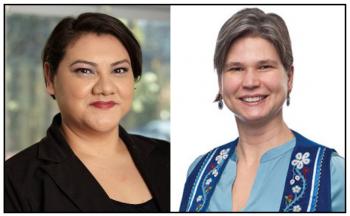Image Caption
Summary
Local Journalism Initiative Reporter
Windspeaker.com
The National Association of Friendship Centres (NAFC) has been undergoing its latest education program to convince Indigenous people across Canada to get vaccinated against the COVID-19 virus.
Jocelyn Formsma, the executive director for NAFC, discussed the Take Action in COVID campaign program, which has been combating “distressingly high” rates of COVID-19 amongst Indigenous people.
In addition to encouraging urban Indigenous populations to get vaccinated, the partnership with Well Living House was created to “provide education, dispel myths, demonstrate the safety and efficacy of the vaccine.”
“We just noticed the need for some communications that were speaking to all Indigenous people, but especially urban Indigenous audiences,” Formsma said in an interview with Windspeaker.com.
“We thought we were just in a really good position to be able to do that because of our network and kind of our role as a trusted service provider across the country.”
The NAFC helps operate more than 100 Indigenous community hubs throughout Canada with various service deliveries.
“The best people to engage, to be able to access those community members are through Indigenous organizations like friendship centres, because they know the community. The community trusts them,” Formsma said.
“They have a good communications network and can get the word out, and, and can also mobilize the community to participate when necessary.”
Formsma said much of the program’s work comes from understanding the reasons why people might not be vaccinated.
“I think what's really been important for us is recognizing we have a very long, and let's say mixed, experience with the healthcare system,” Formsma said.
“Instead of coming from a judgement point of view, let's just listen and figure out how we can provide information that will be helpful to you in a way that you feel confident that you can make the best decision for yourself.”
From there, the NAFC is working to help find accessible clinics that can suit each person’s needs, or in some cases running the clinics right out of the friendship centres themselves.
“On the one hand, it’s ensuring that information is available,” Formsma said. “And then on the other hand, we’re making sure that there are no systemic barriers in the way for people to be able to access the vaccine and healthcare related to COVID.”
The NAFC has also partnered with larger mass vaccination clinics in order for there to be Indigenous representatives welcoming those getting the vaccine to facilitate and answer questions.
“People have varying levels of trust with the current healthcare system and certainly experiences with racism,” Formsma said.
“We're trying to figure out exactly where [lower vaccination rates amongst Indigenous people] are coming from. We suspect that for some of those there are additional barriers to access culturally safe and accessible vaccines.”
Formsma noted the 2020 death of Atikamekw woman Joyce Echaquan, who had uploaded a video of healthcare workers directing racist remarks towards her shortly before her death in a Montreal-area hospital.
“There’s a lot of systemic issues that are faced in healthcare, so we understand if people are hesitant,” Formsma added.
Medical workers have also been joining the push to convince more Indigenous people to get vaccinated.
“I recognize that many Indigenous people have good reasons to be cautious about Western medicine. However, if ever there was a time for action during COVID-19 it is now,” added Dr. Janet Smylie.
Low vaccination rates are particularly worrying now with the highly contagious Delta variant in circulation.
“Low vaccination rates in our communities leave our Elders, children, and those with weaker immune systems at risk of COVID-19. If you are still undecided about COVID-19 vaccination, I am urging you, on behalf of not only yourself but for our Elders and children, to seek out a trustworthy healthcare provider who can answer your questions.”
Smylie added that “disproportionately higher rates of COVID-19 infection and severe illness” are expected in Indigenous communities where vaccination remains low.
For more information about the program, or where to find a friendship centre, visit https://nafc.ca/
Local Journalism Initiative Reporters are supported by a financial contribution made by the Government of Canada.

